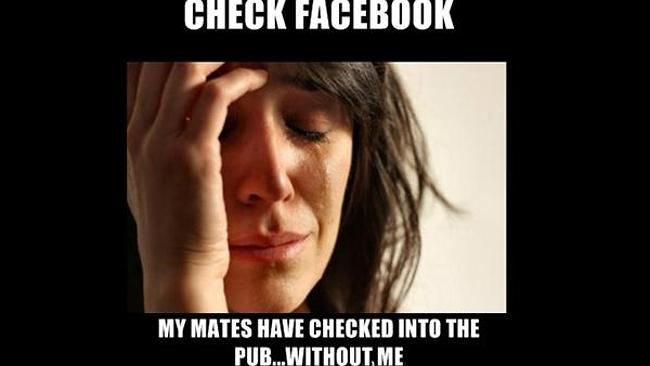Could your FOMO kill you?
THE fear of missing out, also known as FOMO, is a real phenomenon that’s getting worse as we spend more time online. Oh, and it’s killing you.

THE fear of missing out, also known as FOMO, is a real phenomenon. And it only seems to be getting worse as our technology forces us to realise that there’s more and more to miss out on.
Oh, and it might be killing you.
That’s what an in-depth study done on FOMO concluded after studying the link between the fear of missing out, our use of social media and the connection between FOMO and shorter life spans.
Researchers found that “lower levels of need satisfaction, general mood, and overall life satisfaction related to seeking out social media engagement only insofar as they related to higher overall levels of FOMO.”
They also concluded that “fear of missing played a key and robust role in explaining social media engagement,” which means that FOMO is both a cause and an effect of checking Facebook and Twitter. People who have FOMO check social media more often, which only increases their FOMO. #ViciousCycle!
More: How FOMO is ruining my life
Even more worrisome is that the condition might be putting FOMO sufferers at serious risk, because those high in FOMO are more likely to text and drive.
Using your phone while driving contributes to 22 per cent of car accidents in Australia. A 2011 government survey found that three in five Australian drivers aged between 18 and 24 years use their phone while driving - and it’s this age group that suffers most from FOMO. It also prompted the Transport NSW to release their ‘Get your hand off it’ campaign.
So at the very least, FOMO is making us unhappy, and at worst it is threatening to kill us. What does this mean for mental health in the digital age?
First, that we should remember that FOMO is perceptual. We’ve always been missing out on things, but now we have instant means to realise it. Instagram photos, Facebook check-ins, live tweets — they are all drawing our attention away from the present moment and toward events we aren’t part of. Those things were happening anyway, but now they’re in your face and have really pretty filters.
Second, that FOMO is associated with negative emotions, including insecurity, envy, and anxiety. No one’s ever suffered from benign FOMO. We probably already know that, but let’s just call it out — fear isn’t fun, and it isn’t really serving us.
And third, that FOMO has an evolutionary basis. It’s the fear of missing out, and fear has a survival function as a powerful motivator — either to seek out advantageous experiences (perhaps as defined by the social group), to compete for limited resources, and to constantly question whether we’ve made decisions that aid our survival.
So there’s no cure for FOMO itself, but we can beat it by recognising that it’s a false response to the publicity of social media, and a deep-rooted drive to continually engage it.
It’s like we’re watching ancient instincts collide with new technology. We’re amplifying an emotional response that just doesn’t fit in our modern world, which is why the best treatment might just be some perspective and alone time.
Kevin Systrom, co-founder of Instagram, once said that no one likes to perform in a vacuum. But wouldn’t it be nice if we did?
This article was legally licensed from The Huffington Post through the NewsCred publisher network.



